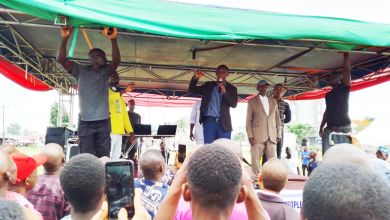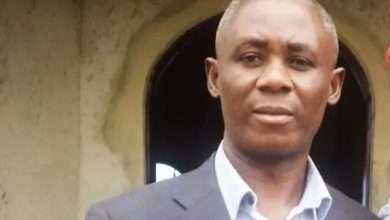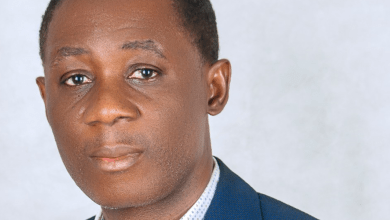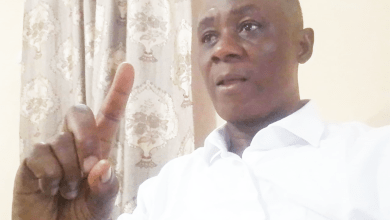Columnists
When a Country Finds it Hard to Admit Her Wrongs by Fegalo Nsuke
Injustice in Nigeria is pervasive. In all parts of our country, you will find people whose rights are being violated, people whose resources are being taken away by the ruling class, the largely unproductive majority and used at the disadvantage of those from whose land the revenues are generated.
The Ogoni case remains Nigeria’s worst case of our country’s inhumanity against its own people. Over 4,000 Ogonis have been killed in state sponsored terrorism and rather than seek to redress these injustices by looking at the causes of the problem with the goal to build society towards development, the Nigerian leadership and Shell opted to suppress peaceful and genuine agitations, muzzle and cover up her many wrongs against the people.
The Ogoni case remains Nigeria’s worst case of our country’s inhumanity against its own people. Over 4,000 Ogonis have been killed in state sponsored terrorism and rather than seek to redress these injustices by looking at the causes of the problem with the goal to build society towards development, the Nigerian leadership and Shell opted to suppress peaceful and genuine agitations, muzzle and cover up her many wrongs against the people.
A simple demand for fair treatment for a people whose land and resources sustain the country has been treated like a rebellion. The army drafted in to kill, abuse, rape and decimate the dignity of the Ogoni people for questioning the way an alliance between Shell and the Nigerian authorities have used state machineries to take away the resources of the Ogoni people, despoiled their land and taken away their basic rights thereby treating them like sub humans.
The hanging of 9 human rights activists from Ogoni on November 10, 1995 including our beloved Ken Saro-Wiwa could best be described as bestial. Indeed, it happened at a time when a beast ruled Nigeria. Thanks to the gifts of nature, he passed on to let Nigeria move on with an opportunity change though, that is yet to seen.
Under the reign of terror, our country was described as bestial and a pariah nation. The treatment of the Ogoni people made our country unfit to associate with the civilized world. Nigeria was promptly suspended from the Commonwealth though, readmitted later after it democratized.
But no one bothered to question The Shell Petroleum Development Company of Nigeria Limited, a subsidiary of Royal Dutch Shell Plc who played an active role in the massacre, funded and provided logistics for the Nigerian military during the crackdown that led to the death of over 4,000 Ogonis and actually facilitated the November 10, 1995 hanging of nine Ogoni leaders and activists..
Shell and Nigeria have been consistently brutal to conquers the Ogoni people. One strategy they used is to withdraw security for the Ogoni people Tthat succeeded as the area became vulnerable and with their efforts to get their allies in political power, the area became militarized with their political conquerors they refer to as loyal boys. They raised political tugs and called them militants and cultists, in their hypocrysy, used the tugs as an excuse to subject the Ogoni population to further depredation and misrepresent the character and integrity of the Ogoni people known all over for their peaceful and upright disposition. Any alliance with Shell is capable of any kind of evil.
The same people who raised political tugs, formed the gangs and nicknamed them cultists go to the media to raise questions about insecurity and claim that only a military intervention can address the problem. The military is here, and the consequences had been the abuse of innocent Ogoni community dwellers occasioning rape, burning of traditional worship centers and artifacts which had been the identity of the Ogoni people.
The shrines of Gbenebeka, the ancient Ogoni deity has been burnt down, the shrines of Bari Gokana, the ancient god of thunder has been burnt down. The efforts to destroy the capacity of the Ogoni people to ask questions is taking a new turn and every Ogoni is today in danger and could be a victim of the Nigerian military in desperation to pull down a small ethnic group who had been so organized to question a multinational oil company’s irresponsibly that has sent and is still sending thousands of people to death.
These are all happening without their divide and rule tactics aided by Nigerias fantastic corruption. They tell our teeming uneducated and ignorant population that oil resumption will bring jobs and development. They do not tell them that when the oil is sold, it goes to a federation account controlled by Abuja and the money is shared by all the states of the federation which Ogoni is not one and so, nothing actually comes to Ogoni.
They wouldn’t let the Ogoni people understand that once the pipelines are laid, and the oil flows to the export terminal, their is no job for anybody. Shell had been in Ogoni for over 35 years before pulling out in 1993 and you can barely find an employee of Shell or a former in any Ogoni community.
They will further want us to set aside all legacy issues, the hanging of Ken Saro-Wiwa and eight others in 1995, the killing of an estimated 4,000 Ogonis in state repression, the abuses and rapes and accept oil production to resume in Ogoni without any discussions on standards, community interests, decriminalization and exoneration of those innocent Ogonis hanged by the Nigerian state.
Having tried every efforts to return Shell and failed, they now look for some private interests which can masquerade as Ogoni interests, push forward the idea of oil resumption just to see how they can possibly enter. The joint venture agreement will remain as it is and rewards will go to privately interests leaving Ogoni, the real population that agitated the change perpetually poor. Ultimately, they want to see that Ogoni will continue to be at the loosing end.
MOSOP insists that discussions on oil resumption must be open, negotiated through a dialogue, a fair engagement process acceptable to the Ogoni people and other parties. There must be a compromise on all sides but fundamental rights of the people should be a priority, The Ogoni people call it “Mii Deekkpr”
“Mii Deekor is a tradition in Ogoni mandating resource exploits to reserve 20percent of the proceeds for the owner of the land/estate. Proceeds from Mii Deekpr are used to maintain the estate, improve infrastructure, protect the property, farmlands and what have you. That is what capitalism and community interests mean to the Ogoni people.
Outside that, the Ogoni people will be out to resist state oppression and the consequences will be more state repression and killings. Ogoni must continue to resist the oprressor and pressure Nigeria and Shell to end the deliberate killings in Ogoni. Nigeria should acept MOSOP’s request for an engagement and amicably address these problems rather than using state powers to forcefully resume oil production in Ogoni.
Indeed, Amnesty International’s assertion on Shell is right. Shell is a criminal enterprise. The company never imagined that there was a Ken Saro-Wiwa who could lead the Ogoni people to understand their deprivations.
Nigeria does not feel bad that an community that has generates an estimated 185,000 barrels of crude oil daily and unquestionably Nigeria’s richest oil producing community wallows in abject poverty. It does not bother the decision makers in our country that Ogoniland deserves a better deal, and open mind and commitment to a just resolution of the conflicts rather than twisted manipulations to divide and conquer .
When a country finds it hard to admit her wrongs, work towards peace and will rather think that the peaceful and nonviolent are the ones to feel the impact of its armies, that country looses its reputation and place in the comity of civilized nations.
Shell and Nigeria’s crimes against the Ogoni people are deliberate and clearly a crime against humanity. It is time to think the other way.
The forthcoming memorial of the 1995 hangings offers another opportunity to the Nigerian government to work towards peaceful reconciliation by exonerating our innocent brothers and fathers hanged by the state 24years ago for there will be no true reconciliation until the innocent martyrs are cleared.
I note that the exoneration and decriminalization of the nine Ogonis hanged by the Nigerian state on November 10, 1995 has become a key component of Ogoni demands. November 10, 2019 offers another opportunity to advance towards peace in Ogoni and in the words of the Nigerian president, Muhammadu Buhari, “Let Us Take It”
Fegalo Nsuke is the President of the Movement for the Survival of the Ogoni People (MOSOP). He wrote from Bori, Ogoniland.




